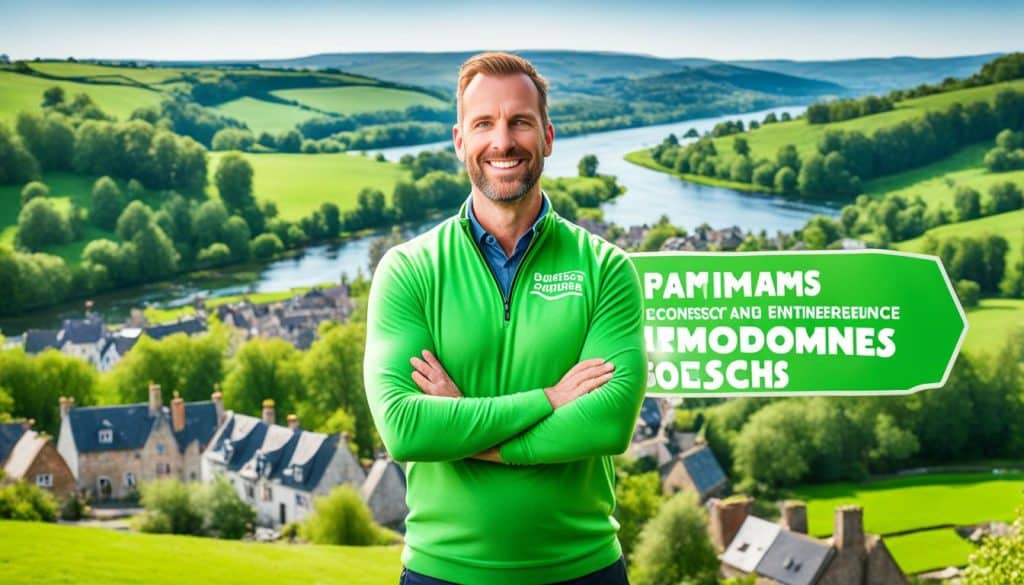Ireland is an amazing place for tourists. It was ranked among the top 20 places to visit in 2020. This beautiful country also supports new businesses well. In fact, it was named the third-best country for setting up a business in Europe. Business tourism is big here, making up 16% of all money spent by visitors from overseas.
- Business Tourism in Ireland
- Choosing the Right Company Type
- Obtaining a Tour Operator License
- Tourism Business Funding Schemes
- Festival Innovation Program
- Employment Investment Incentive Scheme for Tourism
- Certification and Licensing for Hotels
- Minimum and Recommended Criteria for Hotels
- Visitors’ Bedrooms in Hotels
- Bathrooms and Toilets in Hotels
- Dining Area in Hotels
- Instructions and Visitor Information in Hotels
- Conclusion
- FAQ
- Source Links
Thinking of starting a tourism business in Ireland? First, do your research and make a strong plan. You might also need a license to operate tours. Plus, check out the funding options from the National Tourism Development Authority to help your business.
Key Takeaways:
- Establishing a tourism business in Ireland offers great opportunities in a top tourism destination.
- Ireland is ranked as the third-best country for doing business in Europe, providing a supportive environment for start-ups.
- Business tourism is a high-yielding sector in Ireland, accounting for 16% of overseas tourism spend.
- Research and develop a solid business plan to start a successful tourism business in Ireland.
- Obtaining a tour operator license and exploring funding schemes from the National Tourism Development Authority can further support your venture.
Business Tourism in Ireland
Business tourism in Ireland is growing fast, becoming one of the country’s top earners. Since 2011, it has increased by 35%. This makes it a big part of the money spent by tourists from abroad.
Ireland is a great place for business because of its friendly environment and help for new companies. It’s been named the third best for business in Europe. This is good news for people wanting to start a business in tourism.
Business tourism in Ireland brings in a lot of money, much more than people coming for leisure. It’s also a big part of the money spent by international tourists, 16% to be exact. This shows how important it is for the country’s growth and economy.
Ireland is working to attract more business events and meetings. It has a beautiful countryside, lively culture, and warm welcome. This makes it very appealing for business people from other countries.
Business visitors to Ireland help the economy directly by spending money. They also bring in new ideas, chances to meet others, and share knowledge. With modern conference sites and great transport links, Ireland is a top choice for many events. It draws business people from all over the world.
Business Tourism Statistics in Ireland
Here are some facts that show the importance of business tourism in Ireland:
| Statistic | Value |
|---|---|
| Business tourism growth since 2011 | 35% |
| Contribution to overseas tourism spend | 16% |
| Estimated revenue compared to leisure tourism | 3 times higher |
These numbers highlight how big business tourism is and its growing role in Ireland’s economy.
Choosing the Right Company Type
Deciding the right company type is key when starting a tourism business in Ireland. A top pick for many is a Private Company Limited by Shares (LTD). It keeps the business’s finances separate from the owner’s. This shield protects the owner’s personal money and assets if the company runs into money problems.
Having limited liability is great for new businesses. It means your personal money is safe if the business owes money. It can help keep your personal and business life secure. Your risk is only what you put into the company, nothing more.
Choosing an LTD offers a way to protect your own money and at the same time chase your business dreams. Investors and lenders tend to trust companies with this structure more. This option shows a deep promise to run the business carefully and ethically.
Take your time and look into the different company types. Getting advice from professionals is wise. It helps you see the legal and financial sides clearly. The right choice will give your tourism business a strong start and help it succeed over time.
Obtaining a Tour Operator License
Looking to start a tourism business in Ireland? You need to get a tour operator license. This is required if you plan to offer guided tours as a company. The Commission for Aviation and Regulation in Ireland handles these licenses.
Getting a tour operator license means you follow set guidelines. You also have to send in needed documents and pay fees. Make sure you understand what the Commission for Aviation and Regulation wants. This will make your application go smoothly.
For details on how to apply, fees, and what documents you need, go to the Commission for Aviation and Regulation’s site. You’ll find plenty of help there. They offer clear guidelines and resources to aid you in getting your license.
Once you have a tour operator license, it shows you follow the rules. This makes your tourism business more trustworthy in Ireland.
| Step | Description |
|---|---|
| 1 | Research the specific requirements for a tour operator license in Ireland |
| 2 | Gather the necessary documentation as outlined by the Commission for Aviation and Regulation |
| 3 | Submit your application and required fees |
| 4 | Allow time for the Commission for Aviation and Regulation to process your application |
| 5 | Receive approval and your tour operator license |
Tourism Business Funding Schemes
The National Tourism Development Authority supports tourism start-ups in Ireland. It offers different funding schemes aimed at businesses focusing on Ireland’s culture, heritage, and people. Failte Ireland, known as the national authority, has given a big investment under the Government’s Project Ireland 2040 Strategy. This shows the important support for tourism start-ups and how they help the Irish economy.
Festival Innovation Program
Ireland uses festivals and events to shine on the world stage. The Festival Innovation Program finds and makes new events. These events show off Ireland’s varied landscape to visitors globally, all year round, even during less busy times.
The Program will help launch unique events over five years. This work aims to create local jobs and boost the economy, expecting to bring in €150 million.
This effort gives chances to new businesses and people wanting to start in tourism in Ireland. Organising exciting events helps connect with the tourism industry. It also shows off Irish traditions and culture in a fresh way.
The Benefits of the Festival Innovation Program
Being part of the Festival Innovation Program has perks for event organisers and new businesses in tourism:
- Boosting Tourism: Creating unique events helps draw visitors, especially during slow times. This can help grow the industry and draw more people to Ireland.
- Driving Local Employment: It works to create jobs locally, boosting economies across Ireland. By organising events that need many services, new businesses help in job creation and support local services.
- Enhancing the Off-Peak Season: The Program aims to bring people to Ireland all year, not just in busy months. It helps spread out when tourists visit.
- Creating Memorable Experiences: The Program inspires new, unforgettable events. These leave a strong memory on visitors, making their time in Ireland special.
The Festival Innovation Program fits with Ireland’s goal to have an ever-growing and creative tourism sector. It’s a way for new entrepreneurs to join Ireland’s lively festival world. Also, it boosts the economy and creates jobs.
| Festival Innovation Program | Benefits |
|---|---|
| Supports the development of new and unique events | Boosts tourism and attracts visitors |
| Generates local employment opportunities | Drives economic growth |
| Promotes tourism during the off-peak season | Creates memorable experiences for visitors |
Employment Investment Incentive Scheme for Tourism
The Employment Investment Incentive Scheme (EII) gives tax breaks to draw in foreign investment for Ireland’s tourism. It helps tourism businesses by giving tax relief to those who invest. To get this benefit, businesses must get approval from Failte Ireland, the National Tourism Development Authority. They check if the business is likely to succeed, and if it is, they give them a certificate showing they are approved.
Joining the Employment Investment Incentive Scheme means that tourism businesses can enjoy tax benefits. This can pull in more money and help grow Ireland’s tourism. Moreover, it shows the government is keen on entrepreneurs and wants the economy to bloom, especially through tourism.
Both tourism companies and their investors can win big from this scheme. Companies can save money and have more to reinvest in their business. This could help with things like building better facilities, promoting the business, or hiring more staff. On the other hand, investors can back a growing industry, potentially adding to their wealth over time.
This scheme can make Ireland more appealing to international investors. This leads to more money coming in, boosts the economy, and opens up more job chances in tourism. It’s a key part in creating a welcoming space for investment and keeping Irish tourism strong and competitive for the future.
Benefits of the Employment Investment Incentive Scheme:
- Access to tax breaks that attract international investment
- Financial support for tourism businesses in Ireland
- Opportunity to fund business growth and development
- Contributing to the expansion of the tourism industry
- Government commitment to supporting entrepreneurship
- Stimulating economic growth and employment opportunities
- Potential for long-term financial returns for investors
| Employment Investment Incentive Scheme | Benefits |
|---|---|
| Tax breaks | Attract international investment |
| Financial support | For tourism businesses in Ireland |
| Funding opportunities | For business growth and development |
| Expansion of the tourism industry | Contribute to the growth and success of Irish tourism |
| Government support | Commitment to entrepreneurship and economic development |
| Investor returns | Potential for long-term financial gains |
| Economic growth | Stimulate the economy and create employment opportunities |
Certification and Licensing for Hotels
Running a hotel in Ireland means you must have a certificate from Tourism Northern Ireland. This shows the hotel meets the standards needed for safety and quality. Inspectors visit to make sure everything is up to scratch.
It’s vital for hotels to keep their certification up to date. It proves they’re dedicated to top service and maintain high standards. Certificates last four years, then hotels must be checked again to get a new one.
To get certified, hotels need to go through Tourism Northern Ireland. The process includes showing certain documents and a fee. This fee depends on how many rooms the hotel has.
With a Tourism Northern Ireland certificate, hotels not only follow the law but stand out in a crowded market. It shows they are serious about making guests feel safe and welcome.
Benefits of Certification
Getting certified has many good points for hotel owners:
- Enhanced Reputation: Certified hotels are known for their quality, which wins trust with visitors.
- Marketing Advantage: Certification lets hotels brag about their quality in ads and online.
- Compliance with Regulations: Certified hotels are sure to meet health, safety, and quality rules, keeping guests safe.
- Guest Satisfaction: Certification tells guests they’ll get excellent service, which means good reviews.
- Competitive Edge: Certified places do better against other hotels, bringing in more people and money.
Overall, having the Tourism Northern Ireland certificate is about more than just following rules. It’s a key part of doing well and being respected in Ireland’s hotel world.
| Requirements | Details |
|---|---|
| Inspection | Hotels undergo a thorough inspection to assess compliance with health, safety, and quality standards. |
| Validity | The certification is valid for a period of four years. |
| Application Process | Hotels need to apply for certification through Tourism Northern Ireland’s certification program. |
| Fee | Hotels are required to pay a fee based on the number of rooms they intend to let. |
| Benefits | Enhanced reputation, marketing advantage, compliance with regulations, guest satisfaction, and competitive edge. |
Minimum and Recommended Criteria for Hotels
In Ireland, hotels must meet certain standards for service and facilities. This includes the look of the building, safety precautions, parking, and how the entrance is set up. They also need to show their certifications, share tourist info, and keep a record of who stays there.
Exterior Appearance
A hotel’s outside makes the first impression on guests. It should look beautiful and well-kept with the right signs and green spaces. This gives a hint of what to expect inside.
Structural and Safety Requirements
Making sure a hotel is structurally sound and safe is key for everyone’s well-being. Inspect the building often to catch and fix problems early. Make sure there’s enough fire safety equipment to keep everyone safe.
Car-Parking Facilities
Good hotels offer enough parking that’s easy and safe to manouevre. Have clear signs and safe practices in place to protect vehicles.
Entrance Layout and Furnishings
A hotel’s entrance is like a handshake – it’s the first greeting guests get. It must invite people in with comfy seats, pretty decorations, and good lighting. Signage and helpful staff should be there to guide newcomers.
Display of Certification and Charges
Hotels must display their certifications and prices where visitors can see them. Make it clear how many stars the hotel has and list all costs clearly. This helps guests know what to expect when they stay.
Provision of Tourist Literature
It’s important for hotels to have the latest tourist info ready for guests. Brochures, maps, and guides bring the local area to life. This makes visitors’ stays more enjoyable and informed.
Visitors’ Register
Hotels keep a log of every guest to ensure everyone’s safety and to work with local authorities if needed. This helps in emergencies and keeps things running smoothly.
Visitors’ Bedrooms in Hotels
When you stay in a hotel, how your bedroom feels is super important. The room must be just right to make your stay great. This includes the size, what’s inside like the furniture, and what extras are there.
The room’s size really matters. A single room must be at least 7.50 square meters big. A double room needs to be at least 13.00 square meters. This gives guests the space they need for their things and themselves.
Every bedroom needs a private bathroom. In these bathrooms, you’ll find a bath or shower, a toilet, a sink, a mirror, and more. These things make sure you’re clean and comfy during your stay.
For safety and privacy, every bedroom needs a door you can lock. This makes guests feel secure and free to enjoy their own space in peace.
Furniture is key in making a bedroom welcoming. You should have a bed, space to keep your clothes, a place for your things, and somewhere to sit. These items make your stay more like being at home.
In a nutshell, hotel rooms need to be the right size and have the right things. When hotels take care of these details, they make a place where guests feel happy and comfortable. This boosts how much guests enjoy their visit.
Bathrooms and Toilets in Hotels
Guests at a hotel hope for a comfortable stay. They want clean, well-equipped bathrooms and toilets. Hotel owners work hard to make sure their lodging offers a pleasant experience with the facilities.
Fixtures and Plumbing
Hotel bathrooms boast high-quality equipment. They offer a bath or shower, WC, wash basin, mirror, and wash light. It’s vital that everything works well. The plumbing system must correctly give hot and cold water. This ensures guests are happy and comfortable during their whole visit.
En-suite Facilities
En-suite bathrooms are private spaces in a hotel room. They come with a bath or shower, WC, wash basin, mirror, and more. These spaces are kept clean, in good shape, and fully equipped. Everything is in place for a pleasant guest experience.
Guest Comfort and Satisfaction
For every hotel, keeping guests happy is key. Well-kept bathrooms and toilets are a big part of this. They must be clean and work without a hitch. This allows guests to fully enjoy their time at the hotel.
| Requirements | Description |
|---|---|
| Fixtures | High-quality fixtures, including bath or shower, WC, wash basin, mirror, wash light |
| Plumbing | Properly installed and maintained plumbing system for hot and cold running water |
| En-suite Facilities | Bath or shower, WC, wash basin, mirror, wash light, and accessories for holding toilet equipment |
| Cleanliness and Maintenance | Regular cleaning and maintenance to ensure a pleasant and hygienic experience |
Maintaining clean and functional bathrooms is crucial for hotels. It establishes a positive view with visitors. Meeting these high standards improves the hotel’s image and the guest experience.
Dining Area in Hotels
The dining area in a hotel is key for guests’ enjoyment and satisfaction. It should be ready for the number of people it serves. This means having enough seats and a spacious place for people to enjoy their meals.
It’s important that there is plenty of cutlery and crockery. This means guests will always have what they need for their meal. Everything should be clean and shiny too.
Good ventilation is a must. It keeps the air fresh, even when the room is busy. This stops the area from getting too hot or stuffy.
The dining area must be cleaned often. This keeps things hygienic and tidy. Guests shouldn’t see any dirt on the tables or chairs.
How the dining area looks matters a lot too. When it’s nicely decorated, it makes dining more enjoyable. Guests feel welcome in a beautiful space.
Checklist for an Ideal Hotel Dining Area
| Aspect | Requirements |
|---|---|
| Seating Capacity | Sufficient seating to accommodate expected number of guests |
| Cutlery and Crockery | Ample supply of clean and polished cutlery and crockery |
| Ventilation | Proper ventilation for fresh air and to avoid stuffiness |
| Cleanliness | Regular cleaning schedules to maintain a clean and hygienic environment |
| Decorative Order | Well-decorated and aesthetically pleasing ambiance |
Instructions and Visitor Information in Hotels
When you stay at a hotel, it’s key for guests to find clear instructions and vital info to boost their visit. Hotels put in a lot of effort to share info on the place’s facilities, rules, eateries, and more. This helps make your stay smooth and fun. Oh, and the WIFI code is shared too, keeping you online during your visit.
Many hotels give a guest folder when you check-in. It’s packed with what you need to know about the hotel’s perks, services, and what’s nearby. This lets guests smoothly go through their visit, make wise choices, and easily find what they need.
Dining Arrangements
Good food is a big deal for guests, and hotels get that. So, they put details about dining in the guest folder. This includes when the restaurants are open, what they serve, and any cool food events. Knowing this helps you plan meals and, if needed, book a spot for a great food time.
WIFI Code
In our connected world, WIFI is a must for many folks. Hotels make getting online easy by putting the WIFI code in the guest folder. This way, guests can swiftly get their devices online and stay connected whenever they need.
(Repeated Content Removed) By sharing top-class instructions and visitor info, hotels work hard to make guests happy. The guest folder is there to help you find everything you need, from how to dine well to getting online. Having this info ready means you can enjoy your hotel visit to the fullest, with fun and no stress.
Conclusion
Starting a tourism business in Ireland can be a great opportunity. It’s very supportive and rich in tourism. You can start a business for either business or leisure travel. There’s a lot of potential here.
To start, do your research and make a solid plan. You’ll need to get the right licenses and certifications. Offering an excellent guest experience is key to your success.
The government in Ireland really supports the tourism sector. They offer funding help. With all this support, starting your tourism business in Ireland is a great idea. Ireland is ready for you to begin.
FAQ
Q: What are the benefits of establishing a tourism business in Ireland?
Q: What is the significance of business tourism in Ireland?
Q: What is the recommended company type for private tourism business ventures in Ireland?
Q: Do I need a tour operator license to start a tourism business in Ireland?
Q: What funding schemes are available to support tourism start-ups in Ireland?
Q: How does the Festival Innovation Program support tourism start-ups in Ireland?
Q: What is the Employment Investment Incentive Scheme for Tourism?
Q: What is the certification requirement for hotel businesses in Ireland?
Q: What criteria should hotels meet in Ireland?
Q: What are the requirements for bedrooms in hotels?
Q: What are the requirements for bathrooms and toilets in hotels?
Q: What should the dining area in hotels provide?
Q: How should hotels provide instructions and visitor information?
Source Links
- https://www.failteireland.ie/FailteIreland/media/WebsiteStructure/Documents/2_Develop_Your_Business/1_StartGrow_Your_Business/So-you-Want-to-Start-a-Tourism-Business.pdf
- https://www.tourismni.com/globalassets/business-development/quality-and-standards/accommodation-start-up-advice/hotel/hotel-business-start-up-guide—2023.pdf
- https://www.companyformations.ie/blog/starting-a-tourism-business-in-ireland-a-how-to-guide/

















